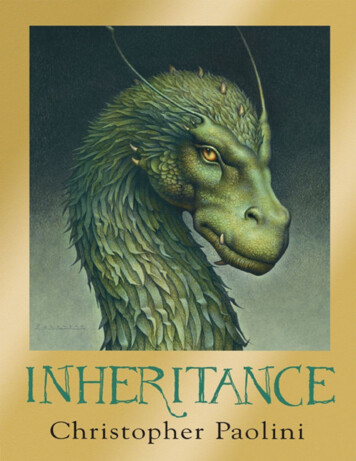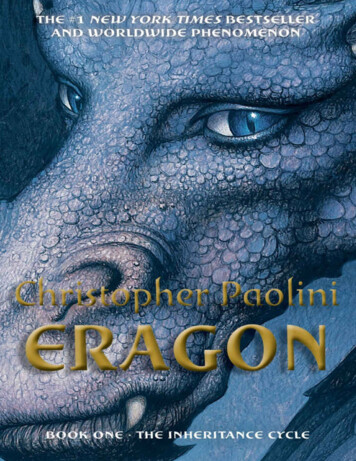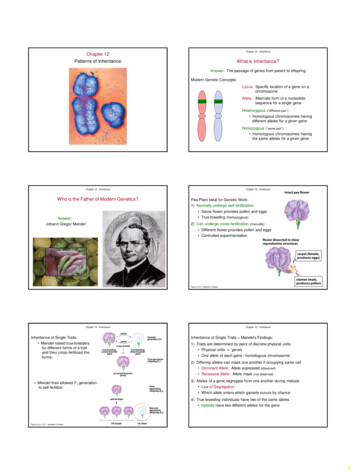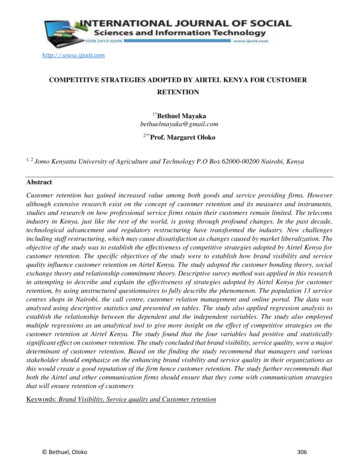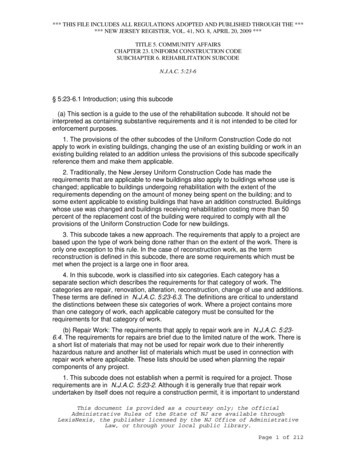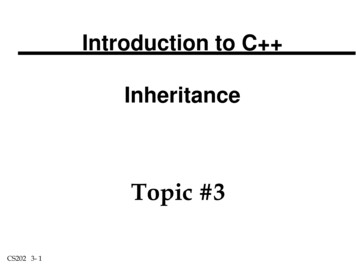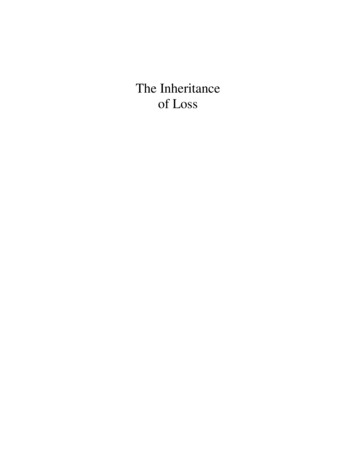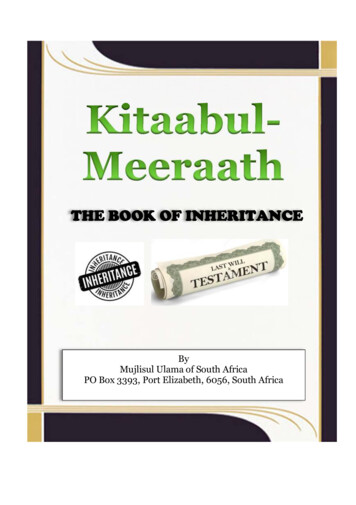
Transcription
STATESTATUTESCurrent ThroughFebruary 2016WHAT’S INSIDEIntestate Inheritance Rightsfor Adopted PersonsBirth parents andadopted childrenLeaving a will is the best way to ensure that heirs orAdoptive parents andadopted childrenproperty distribution may arise when a birth parentAdopted children whoare not included in a willdescendants may inherit from your estate. Issues ofor adoptive parent dies without making a valid willor without naming an heir to particular property(referred to as intestacy). In these cases, State lawSummaries of State lawsdetermines who may inherit from whom. Laws in all50 States, the District of Columbia, American Samoa,Guam, the Northern Mariana Islands, Puerto Rico,and the Virgin Islands specify an adopted person’sright to inherit from the estate of either adoptive orbirth parents.Children’s Bureau/ACYF/ACF/HHS800.394.3366 Email: info@childwelfare.gov https://www.childwelfare.govTo find statuteinformation for aparticular State,go aws-policies/state/.
https://www.childwelfare.govIntestate Inheritance Rights for Adopted PersonsBirth Parents and Adopted ChildrenGenerally, the court decree that finalizes the adoptionends the legal relationship between the birth parent(also referred to as the biological or natural parent inthe statutes) and the adopted child. There are, however,exceptions to this policy in some States. For example: Alaska, Idaho, Illinois, and Maine provide for acontinuation of inheritance rights if so stated in theadoption decree. In Kansas, Louisiana, Rhode Island, and Texas, anadoption decree terminates the right of the birthparent to inherit from the adopted child, but theadopted child may still inherit from the birth parent. Illinois allows the birth parents to acquire from theadopted child’s estate any property gained from themas a gift, through a will, or under intestate laws. In Pennsylvania, an adopted person may inherit fromthe estate of a birth relative, other than a birth parent,who has maintained a familial relationship with theadopted person. In approximately 14 States, if a child is adopted by astepmother or stepfather after his or her birth parentdies (as long as the deceased parent’s parental rightshad not been terminated prior to his or her death), theadopted child’s right of inheritance from or throughthe deceased birth parent or any biological relative isunaffected by the adoption.1Adoption by the spouse of a birth parent generally has noeffect on the right of the adopted child to inherit from orthrough that birth parent. In 11 States, when a child hasbeen adopted by a stepparent, the child may inherit fromeither birth parent, depending on the circumstances.2The word “approximately” is used to stress the fact that States frequentlyamend their laws. This information is current through February 2016. TheStates that provide for inheritance from a deceased birth parent are Alaska,Connecticut, Florida, Georgia, Idaho, Iowa, Massachusetts, Minnesota, NewJersey, North Dakota, Ohio, Oregon, Tennessee, and Wisconsin.2Alabama, Arizona, California, Colorado, Maine, Michigan, Montana,Oregon, South Dakota, Utah, and Vermont.1Adoptive Parents and AdoptedChildrenUpon the entry of the final adoption decree, the adoptedchild is treated by law as if he or she had been born to theadopting parents. The adopted child, therefore, gains theright to inherit from the adoptive parents and adoptiveparents’ relatives. Adoptive parents and other adoptiverelatives also gain the right to inherit from the adoptedchild.Adopted Children Who Are NotIncluded in a WillIntestate law often applies to adopted children who arenot specifically named in the will of the adopted parent.Usually this occurs when they are adopted after the willwas made and it was never updated or amended.The laws in approximately 44 States and the NorthernMariana Islands address this situation.3 Generally,adopted individuals are included in class gifts and otherterms of relationship in accordance with the rules forintestate succession.4 For example, if a will stipulates thatall children of the deceased parent are entitled to anequal share, the adopted person is included whether ornot he or she is specifically named. Also, when a parentfails to provide for any of his or her children, whether byaccident or if the person was adopted after the will wasmade, that person shall have a share of the parent’s estateas if the parent had died intestate. This last rule appliesunless there is evidence that the omission was intentionalor that the parent provided for the adopted personoutside the will.The States that provide for intestate inheritance for adopted children whoare omitted from a will include Alabama, Alaska, Arizona, Arkansas, California,Colorado, Connecticut, Delaware, Florida, Georgia, Hawaii, Idaho, Indiana,Iowa, Kentucky, Maine, Maryland, Massachusetts, Michigan, Minnesota,Mississippi, Missouri, Montana, Nebraska, Nevada, New Hampshire, NewJersey, New Mexico, New York, North Carolina, North Dakota, Ohio,Oklahoma, Oregon, Pennsylvania, South Carolina, South Dakota, Texas, Utah,Vermont, Virginia, Washington, West Virginia, and Wisconsin.4The term “class” refers to all those persons in the same category or levelof rights, such as heirs of a deceased person who are related by the samedegree.3This material may be freely reproduced and distributed. However, when doing so, please credit Child Welfare Information Gateway.This publication is available online at s-policies/statutes/inheritance/.2
Intestate Inheritance Rights for Adopted Personshttps://www.childwelfare.govThis publication is a product of the State StatutesSeries prepared by Child Welfare InformationGateway. While every attempt has been madeto be complete, additional information on thesetopics may be in other sections of a State’s codeas well as agency regulations, case law, andinformal practices and procedures.Suggested Citation:Child Welfare Information Gateway. (2016). Intestateinheritance rights for adopted persons. Washington,DC: U.S. Department of Health and Human Services,Children’s Bureau.This material may be freely reproduced and distributed. However, when doing so, please credit Child Welfare Information Gateway.This publication is available online at s-policies/statutes/inheritance/.3
Intestate Inheritance Rights for Adopted Personshttps://www.childwelfare.govAlabamaBirth Parents in Relation to Adopted PersonCitation: Ala. Code § 43-8-48For purposes of intestate succession, an adopted person is the child of an adopting parent and not of the birth parents, exceptthat adoption of a child by the spouse of a birth parent has no effect on the right of the child to inherit from or through either birthparent.Adoptive Parents in Relation to Adopted PersonCitation: Ala. Code §§ 43-8-48; 26-10A-29For purposes of intestate succession, an adopted person is the child of an adopting parent and not of the birth parents, exceptthat adoption of a child by the spouse of a birth parent has no effect on the right of the child to inherit from or through either birthparent.After adoption, the adopted person shall be treated as if he or she was born to the adopting parents and shall have all rights and besubject to all of the duties arising from that relation, including the right of inheritance.Adopted Persons Who Are Not Included in a WillCitation: Ala. Code §§ 43-8-91; 43-8-230If a testator fails to provide in his or her will for any of his or her children adopted after the execution of the will, the omitted childreceives a share in the estate equal in value to that which he or she would have received if the testator had died intestate unless: It appears from the will that the omission was intentional. When the will was executed, the testator had one or more children and devised substantially all his or her estate to the otherparent of the omitted child. The testator provided for the child by transfer outside the will, and it can be reasonably proven that the transfer was intendedto be in lieu of a testamentary provision.Adopted persons are included in class gift terminology and terms of relationship in accordance with rules in determiningrelationships for purposes of intestate succession.AlaskaBirth Parents in Relation to Adopted PersonCitation: Alaska Stat. §§ 25.23.130; 13.12.114A final decree of adoption relieves the birth parents of the adopted person of all parental rights and responsibilities and terminatesall legal relationships between the adopted person and the birth parents and other relatives of the adopted person. Thereafter, theadopted person is a stranger to the former relatives for all purposes, including inheritance, unless: The decree of adoption specifically provides for continuation of inheritance rights. The interpretation or construction of documents, statutes, and instruments, whether executed before or after the adoption isdecreed, expressly include the person by name or by some designation not based on a parent and child or blood relationship.A decree terminating parental rights on the grounds set out in § 25.23.180(c)(3) [that the parent committed sexual assault or sexualabuse of a minor that resulted in the conception of the child] voids all legal relationships between the child and the birth parent forall purposes, except that inheritance rights between a child and a birth parent are not voided by the decree terminating parentalrights, unless the decree specifically provides for the termination of inheritance rights.If a parent of a child dies without parental rights having been previously terminated, and a spouse of the surviving parent thereafteradopts the child, the child's right of inheritance from or through the deceased parent is unaffected by the adoption.An adopted person is the child of the person's adopting parent(s) and not of the person's birth parents, but adoption of a child bythe spouse of either birth parent does not affect: The relationship between the child and that birth parent The right of the child or a descendant of the child to inherit from or through the other birth parentAdoptive Parents in Relation to Adopted PersonCitation: Alaska Stat. § 25.23.130A final decree of adoption creates the relationship of parent and child between petitioner and the adopted person, as if the adoptedperson were a legitimate blood descendant of the petitioner, for all purposes, including inheritance.This material may be freely reproduced and distributed. However, when doing so, please credit Child Welfare Information Gateway.This publication is available online at s-policies/statutes/inheritance/.4
Intestate Inheritance Rights for Adopted Personshttps://www.childwelfare.govAdopted Persons Who Are Not Included in a WillCitation: Alaska Stat. §§ 13.12.705; 13.12.302Adopted individuals and their descendants, if appropriate to the class, are included in class gifts and other terms of relationship inaccordance with the rules for intestate succession.If a testator fails to provide in his or her will for children who were adopted after the execution of the will, the omitted after-adoptedchild receives a share in the estate as follows: If the testator did not have a child living when he or she executed the will, an omitted after-adopted child receives a share inthe estate equal in value to that which the child would have received had the testator died intestate, unless the will gives all orsubstantially all of the estate to the other parent of the omitted child and that other parent survives the testator and is entitledto inherit under the will. If the testator had one or more children living when he or she executed the will, and the will gives property or an interest inproperty to one or more of the then-living children, an omitted after-adopted child is entitled to share in the testator's estateas follows:» The portion of the estate in which the omitted after-adopted child is entitled to share is limited to bequests made to thetestator's then-living children under the will.» The omitted after-adopted child is entitled to receive the share of the estate that the child would have received had thetestator included all omitted after-born and after-adopted children with the children to whom bequests were made underthe will and had given an equal share of the estate to each child.Neither provision above applies if: It appears from the will that the omission was intentional. The testator provided for the omitted after-adopted child by transfer outside the will and the intent that the transfer be in lieuof a testamentary provision is shown by the testator's statements or is reasonably inferred from the amount of the transfer orother evidence.American SamoaBirth Parents in Relation to Adopted PersonCitation: Ann. Code § 45.0423The birth parents are divested of all legal rights and obligations with respect to the child and vice versa.Adoptive Parents in Relation to Adopted PersonCitation: Ann. Code § 45.0423After the entry of a final decree of adoption, the petitioner and the adopted person sustain toward each other the legal relation ofparent and child, including the rights of inheritance from each other.Adopted Persons Who Are Not Included in a WillThis issue is not addressed in the statutes reviewed.ArizonaBirth Parents in Relation to Adopted PersonCitation: Rev. Stat. §§ 8-117; 14-2114The relationship of birth parent and adopted person is completely severed upon entry of the adoption decree, and all legalconsequences of the relationship cease to exist, including the right of inheritance.Adoption of a child by the spouse of either birth parent has no effect on the relationship between the child and that birth parent oron the right of the child or a descendant of the child to inherit from or through the other birth parent.Adoptive Parents in Relation to Adopted PersonCitation: Rev. Stat. § 8-117The adopted person is entitled to inherit from and through the adoptive parent, and the adoptive parent is entitled to the same fromthe adopted person, as though the child were born to the adoptive parents in lawful wedlock.This material may be freely reproduced and distributed. However, when doing so, please credit Child Welfare Information Gateway.This publication is available online at s-policies/statutes/inheritance/.5
Intestate Inheritance Rights for Adopted Personshttps://www.childwelfare.govAdopted Persons Who Are Not Included in a WillCitation: Rev. Stat. §§ 14-2705; 14-2302A person who is adopted and that person's descendants, if appropriate to the class, are included in class gifts and other terms ofrelationship in accordance with intestate succession.If a testator fails to provide by will for a child who is adopted after the testator executes the will, the omitted child receives a share inthe estate as follows: If the testator had no child living when the testator executed the will, an omitted child receives a share in the estate equal invalue to what the child would have received if the testator had died intestate, unless the will devised all or substantially all of theestate to the other parent of the omitted child and that other parent survives the testator and is entitled to take under the will. If the testator had one or more children living when the testator executed the will, and the will devised property or an interest inproperty to one or more of the then-living children, an omitted child is entitled to share in the testator's estate as follows:» The portion of the testator's estate in which the omitted child is entitled to share is limited to bequests made to thetestator's then-living children under the will.» The share of the testator's estate that the child would have received if the testator had included all omitted children with thechildren to whom devises were made under the will and had given an equal share of the estate to each child.However, if it appears from the will that the omission was intentional or that the testator provided for the omitted child by transferoutside the will and the intent that the transfer be in lieu of a testamentary provision is shown by the testator's statements or can bereasonably inferred from the amount of the transfer or other evidence, no share in the estate will be received.ArkansasBirth Parents in Relation to Adopted PersonCitation: Ann. Code § 9-9-215The adoption decree relieves the birth parents of the adopted person of all parental rights and responsibilities and terminates all legalrelationships between the adopted person and his or her birth relatives, including his or her birth parents, so that the adopted personthereafter is a stranger to his or her former relatives for all purposes including inheritance.Adoptive Parents in Relation to Adopted PersonCitation: Ann. Code § 9-9-215The adoption decree creates the relationship of parent and child between the adoptive parent and the adopted person, as if theadopted person were a legitimate blood descendant of the petitioner, for all purposes, including inheritance.Adopted Persons Who Are Not Included in a WillCitation: Ann. Code § 28-39-407Whenever a child was adopted by a person after he or she has made his or her will, and the person dies leaving the adopted childnot mentioned or provided for in his or her will, either specifically or as a member of a class, the person shall be deemed to have diedintestate with respect to the child. The child shall be entitled to recover from the estate, in proportion to the amounts of the respectiveshares of other heirs, that portion of the estate which he or she would have inherited had there been no will.CaliforniaBirth Parents in Relation to Adopted PersonCitation: Prob. Code § 6451An adoption severs the relationship of parent and child between an adopted person and a birth parent of the adopted person unlessboth of the following requirements are satisfied: The birth parent and the adopted person lived together at any time as parent and child, or the birth parent was married to orcohabiting with the other birth parent at the time the person was conceived and died before the person's birth. The adoption was by the spouse of either of the birth parents or after the death of either of the birth parents.Neither a birth parent nor a relative of a birth parent, except for a whole-blood brother or sister of the adopted person or the issue ofthat brother or sister, inherits from or through the adopted person on the basis of a parent and child relationship between the adoptedperson and the birth parent that satisfies the requirements listed above, unless the adoption is by the spouse or surviving spouse ofthat parent.This material may be freely reproduced and distributed. However, when doing so, please credit Child Welfare Information Gateway.This publication is available online at s-policies/statutes/inheritance/.6
Intestate Inheritance Rights for Adopted Personshttps://www.childwelfare.govA prior adoptive parent and child relationship is treated as a birth parent and child relationship.Adoptive Parents in Relation to Adopted PersonCitation: Prob. Code § 6450A relationship of parent and child exists for the purpose of determining intestate succession by, through, or from a person betweenan adopted person and the person's adopting parent or parents.Adopted Persons Who Are Not Included in a WillCitation: Prob. Code §§ 21115; 21620Except as provided below, adopted persons and the issue of these persons, when appropriate to the class, are included in terms ofclass gift or relationship in accordance with the rules for determining relationship and inheritance rights for purposes of intestatesuccession.If a decedent fails to provide in his or her will for a child who was adopted after the execution of the will, the omitted child shallreceive a share in the estate equal in value to that which the child would have received if the decedent had died intestate.ColoradoBirth Parents in Relation to Adopted PersonCitation: Rev. Stat. §§ 15-11-114(1); 15-11-119A parent is barred from inheriting from or through a child of the parent if: The parent's parental rights were terminated and the parent-child relationship was not judicially reestablished. The child died before reaching age 18 and there is clear and convincing evidence that immediately before the child's deaththe parental rights of the parent could have been terminated on the basis of nonsupport, abandonment, abuse, neglect, orother actions or inactions of the parent toward the child.Except as otherwise provided below, a parent-child relationship does not exist between an adoptee and the adoptee's geneticparents. A parent-child relationship exists between a person who is adopted by the spouse of either genetic parent and: The genetic parent whose spouse adopted the person The other genetic parent who is not a third-party donor, but only for the purpose of the right of the adoptee or a descendantof the adoptee to inherit from or through the other genetic parentA parent-child relationship exists between a person who is adopted by a second parent and: The genetic parent who consented to the adoption The other genetic parent, but only for the purpose of the right of the adoptee or a descendent of the adoptee to inherit fromor through the other genetic parentA parent-child relationship exists between both genetic parents and a person who is adopted by a relative of a genetic parent or bythe spouse or surviving spouse of a relative of a genetic parent, but only for the purpose of the right of the adoptee or a descendantof the adoptee to inherit from or through either genetic parent.A parent-child relationship exists between both genetic parents and a person who is adopted after the death of both geneticparents, but only for the purpose of the adoptee or a descendant of the adoptee to inherit through either genetic parent.Adoptive Parents in Relation to Adopted PersonCitation: Rev. Stat. § 19-5-211After the entry of a final decree of adoption, the adopted person shall be, for all intents and purposes, the child of the petitioner. Heor she is entitled to all the rights and privileges and all the obligations of a child born in lawful wedlock of the petitioner.Adopted Persons Who Are Not Included in a WillCitation: Rev. Stat. §§ 15-11-302; 15-11-705Except as provided below, if a testator fails to provide in his or her will for any of his or her children adopted after the execution ofthe will, the omitted after-adopted child receives a share in the estate as follows: If the testator had no child living when he or she executed the will, an omitted after-adopted child receives a share in theestate equal in value to that which the child would have received had the testator died intestate, unless the will gave all orsubstantially all the estate to the other parent of the omitted child and that other parent survives the testator and is entitled totake under the will.This material may be freely reproduced and distributed. However, when doing so, please credit Child Welfare Information Gateway.This publication is available online at s-policies/statutes/inheritance/.7
Intestate Inheritance Rights for Adopted Personshttps://www.childwelfare.gov If the testator has one or more children living when he or she executed the will, and the will gave property or an interest inproperty to one or more of the then-living children, an omitted after-adopted child is entitled to share in the estate as follows:» The portion of the estate that the omitted after-adopted child is entitled to share is limited to bequests made to thetestator's then-living children under the will.» The omitted after-adopted child is entitled to receive the share of the estate that the child would have received had allomitted after-born and after-adopted children been included with the children to whom bequests were made and an equalshare of the estate given to each child.If it appears from the will that the omission was intentional or the testator provided for the omitted after-adopted child by transferoutside the will and the intent that the transfer be in lieu of a testamentary provision is shown by the testator's statements or isreasonably inferred from the amount of the transfer or other evidence, a share will not be received by the child.A class gift that uses a term of relationship to identify class members includes adopted persons.ConnecticutBirth Parents in Relation to Adopted PersonCitation: Gen. Stat. § 45a-731(6), (8)The birth parent(s) and their relatives shall have no rights of inheritance from or through the adopted person, nor shall the adoptedperson have any rights of inheritance from or through the birth parent(s) or their relatives.When one of the birth parents of a minor child has died, adoption of the child shall not affect the rights of the child to inherit from orthrough the deceased parent and the deceased parent's relatives.Adoptive Parents in Relation to Adopted PersonCitation: Gen. Stat. § 45a-731(1)-(3)A final decree of adoption shall have the following effect: All rights, duties, and other legal consequences of the birth relation of child and parent thereafter exist between the adoptedperson and the adoptive parent(s) and the relatives of such adoptive parent(s). The adopted person shall be treated as if theywere the birth child of the adoptive parent(s). The adoptive parent(s) and the adopted person shall have rights of inheritance from and through each other. Such rightsextend to adopted relatives and the heirs of the adopted person. The adopted person and the birth children and other adopted children of the adoptive parent(s) shall be treated as siblings,having rights of inheritance from and through each other. Such inheritance rights shall be extended to the heirs of all thechildren.Adopted Persons Who Are Not Included in a WillCitation: Gen. Stat. § 45a-257bIf a testator fails to provide in his or her will for any of his or her children who were adopted after the execution of the will, includingany child who is born as a result of artificial insemination to which the testator consented and any child born after the death of thetestator, the omitted after-born or after-adopted child receives a share in the estate as follows: If the testator had no child living when the will was executed, an omitted or after-adopted child receives a share in the estateequal in value to that which he or she would have received had the testator died intestate, unless the will bequeathed all orsubstantially all of the estate to the other parent of the omitted child and that other parent survives the testator. If the testator had one or more children living when he or she executed the will, and the will bequeathed property or aninterest in property to one or more of the then-living children, an omitted after-adopted child is entitled to share in thetestator's estate as follows:» Unless it appears from the will that the testator intended to make a limited provision that specifically applied only to his orher living children at the time the will was executed, the after-adopted child receives the portion of the estate that he orshe would have had the testator died intestate.» The omitted after-adopted child is entitled to receive the share of the estate, as limited above, that the child would havereceived had the testator included all omitted after-born and after-adopted children with the children to whom bequestswere made under the will and had given an equal share of the estate to each child.If it appears that the omission was intentional or the testator provided for the child by transfer outside the will with the intent that thetransfer be in lieu of a testamentary provision, the child shall receive no share of the estate.This material may be freely reproduced and distributed. However, when doing so, please credit Child Welfare Information Gateway.This publication is available online at s-policies/statutes/inheritance/.8
Intestate Inheritance Rights for Adopted Personshttps://www.childwelfare.govDelawareBirth Parents in Relation to Adopted PersonCitation: Ann Code Tit. 13, § 920; Tit. 12, § 508Upon the issuance of an adoption decree, the adopted child shall lose all rights of inheritance from his or her birth parents and theirrelatives. The rights of the birth parents or relatives to inherit from the child also shall cease. Adoption of the child by the spouse of abirth parent has no effect on the relationship between the child and that birth parent for purposes of intestate succession.Adoptive Parents in Relation to Adopted PersonCitation: Ann. Code Tit. 13 § 920Upon the issuance of the adoption decree, the adopted child shall acquire the right to inherit from his or her adoptive parent(s) andtheir relatives, and the adoptive parent(s) and their relatives shall at the same time acquire the right to inherit from the adopted child.Adopted Persons Who Are Not Included in a WillCitation: Ann. Code Tit. 13, § 920; Tit. 12, § 301The rights of a child adopted after the making of a will by the adopting parent(s), shall be the same as the rights of an after-bornchild, as prescribed in Title 12, § 301.A child born after his or her parent has made a last will and testament and for which such parent made no provision, vested orcontingent, specifically or as member of a class, by will or otherwise, shall take the same portion of his or her parent's estate, bothreal and personal, that the child would have been entitled to if such parent had died intestate unless the testator has provided in thelast will and testament that the birth of any child or children subsequently shall not affe
continuation of inheritance rights if so stated in the adoption decree. In Kansas, Louisiana, Rhode Island, and Texas, an adoption decree terminates the right of the birth parent to inherit from the adopted child, but the adopted child may still inherit from the birth pare
